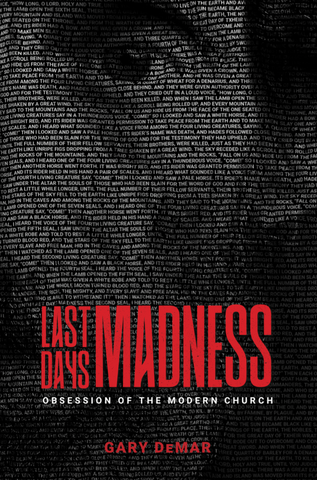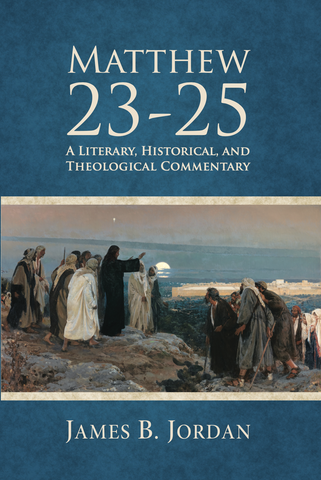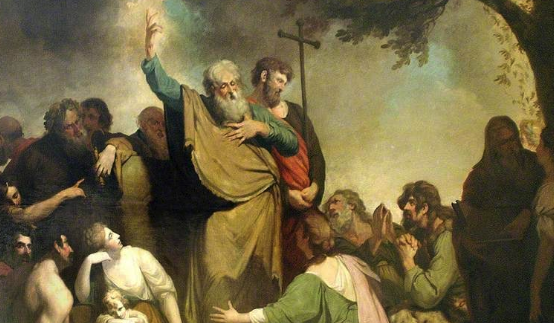Audience relevance is an important consideration when dealing with the interpretation of any text. This is especially true when interpreting prophecy. Who’s the intended audience? This is especially true when interpreting Matthew 24. The use of the second person plural (you) unmistakably applies to those in Jesus’ audience. We know this because there is an audience: “And Jesus came out from the temple and was going away when His disciples came up to point out the temple buildings to Him. And He answered and said to them, ‘Do you not see all these things?’” (24:1-2). Follow the use of “you” and “them” throughout the chapter (vv. 4, 6, 9, 15, 20, 23, 25, 26, 33, 34). Verse 33 is the clincher: “even so you too, when you see all these things, you know that He is near, at the doors.”
You can follow the use of “them” and “you” from Matthew 21:2. The chief priests and scribes understood the audience relevance (21:15-17, 23, 30-32). Notice what follows:
Therefore I say to you, the kingdom of God will be taken away from you and given to a people producing its fruit. And the one who falls on this stone will be broken to pieces; and on whomever it falls, it will crush him.” When the chief priests and the Pharisees heard His parables, they understood that He was speaking about them. And although they sought to arrest Him, they feared the crowds, since they considered Him to be a prophet (21:43-46).
The audience references are unmistakable that continue through chapter 23. Preterists of all kinds point to the contemporary present audiences of Jesus in these chapters as proof that Jesus was referencing what was going to happen to that generation, that is, their generation.

Last Days Madness
In this authoritative book, Gary DeMar clears the haze of "end-times" fever, shedding light on the most difficult and studied prophetic passages in the Bible, including Daniel 7:13-14; 9:24-27; Matt. 16:27-28; 24-25; Thess. 2; 2 Peter 3:3-13, and clearly explaining a host of other controversial topics.
Buy NowLet’s apply the same procedure to 2 Thessalonians 1:7. Here’s how Ken Gentry understands the passage:
[Paul] is encouraging them in the long haul by noting that, despite their current, ongoing persecutional suffering (v. 5), one day in the future God will: (1) not only repay those who persecute them (v. 6) but (2) grant ultimate, glorious relief to these faithful believers who are suffering in history (v. 7a). But then he notes when this relief will be granted: “when the Lord Jesus will be revealed from heaven” (v. 7b). That is, “at the revelation of the Lord Jesus [Gk., en te apokalupsei tou kuriou Iesou].”
In 2 Thessalonians 1:7-8 (actually verses 4 to 12) Paul had his present recipients of his letter in view: “for you … your faith … love of each other … speak proudly of you … your persecutions and afflictions which you endure … that you may be considered worthy … indeed you are suffering … those who afflict you and to give relief to you who are afflicted and to us as well when the Lord Jesus shall be revealed from heaven with His mighty angels in flaming fire.” The audience’s relevance couldn’t be any clearer. The parallels are found in Matthew 16:27-28 and Jude 14-16. Jude’s use of Deuteronomy 33:2 indicates that these comings are not describing the end of the world. Second Thessalonians 2 begins with the use of audience specific references: “Grace to you … give thanks to God for you … your faith … each other … one another.” It continues:
As a result, we ourselves speak proudly of you among the churches of God for your perseverance and faith in the midst of all your persecutions and afflictions which you endure. This is a plain indication of God’s righteous judgment so that you will be considered worthy of the kingdom of God, for which you indeed are suffering. For after all it is only right for God to repay with affliction those who afflict you (2 Thess. 1:4-6).
Paul has no other audience in mind except the Thessalonians. Let’s add the following verses and ask if the audience changes:
and to give relief to you who are afflicted, along with us, when the Lord Jesus will be revealed from heaven with His mighty angels in flaming fire, dealing out retribution to those who do not know God, and to those who do not obey the gospel of our Lord Jesus. These people will pay the penalty of eternal destruction, away from the presence of the Lord and from the glory of His power, when He comes to be glorified among His saints on that day, and to be marveled at among all who have believed—because our testimony to you was believed.
Should we believe that Paul switches from his present audience to the distant future for vindication where God will only deal “out retribution to those who do not know God and to those who do not obey the gospel of our Lord Jesus” (v. 8)? Paul was referring to people in his day using language like what Jesus said in Matthew 16:27-28 (also Jude 1:14-16), verses that Gentry and others apply to the events surrounding AD 70.
“For the Son of Man is going to come in the glory of His Father with His angels and WILL THEN REPAY EVERY PERSON ACCORDING TO HIS DEEDS. Truly I say to you, there are some of those who are standing here who will not taste death until they see the Son of Man coming in His kingdom.”
How would the Thessalonians have been vindicated in their day if a long-term postponement was proposed by Paul? That retribution came in events leading up to and including the destruction of the temple in AD 70. We know this is true because of what Paul wrote in 1 Thessalonians 2:14-16:
For you, brothers, became imitators of the churches of God in Judea that are in Christ Jesus. You suffered from your own countrymen the very things they suffered from the Jews, who killed both the Lord Jesus and their own prophets, and drove us out as well. They are displeasing to God and hostile to all men, hindering us from telling the Gentiles how they may be saved. As a result, they continue to heap up their sins to full capacity; the utmost wrath has come upon them.
We learn from the book of Acts that the Judaizers were persecuting Christians in Thessalonica (17:1-11). Their day of judgment would come when the temple and all its attendant rituals passed away. Judgment would come quickly. “And the Lord said, ‘Listen to what the unrighteous judge said; now, will God not bring about justice for His elect who cry out to Him day and night, and will He delay long for them? I tell you that He will bring about justice for them quickly. However, when the Son of Man comes, will He find faith on the earth?” (Luke 18:7-9).”
The earliest persecutors of Christians were the Jewish religious leaders. In time, when the prophecy Jesus said would take place in their generation, that persecution would be eliminated. This means that 2 Thessalonians 1:7 is the same coming used elsewhere in Scripture that describes Jesus’ coming in judgment and vindication for that Apostolic generation.
Technically, passages like Matthew 16:27-28, 24:30, Revelation 1:7, and 2 Thessalonians 1:7-9 (among others) are Second Coming passages if the Incarnation (John 1:14) is the first coming (Heb. 9:28).

Matthew 23-25: A Literary, Historical, and Theological Commentary
Those who first read Matthew’s gospel only would have had as an interpretive reference what we describe as the Old Testament. They were living the history that Jesus said would take place before their generation passed away. They would have immediately noted the Old Testament parallels with the abomination of desolation (Matt. 24:15; Dan. 9:27), the judgment on Sodom and fleeing to the mountains to escape the coming conflagration (Matt. 24:16; Gen. 19:17), false prophets (Matt. 24:24; Jer. 14:14), signs in the sun, moon, and stars (Matt. 24:29; Isa. 3:10; 24:33; Ezek. 32:7; Amos 5:2; 8:9; etc.), the Son of Man coming on the clouds of heaven (Matt. 24:30; Dan. 7:13), and so much more.
Buy Now
